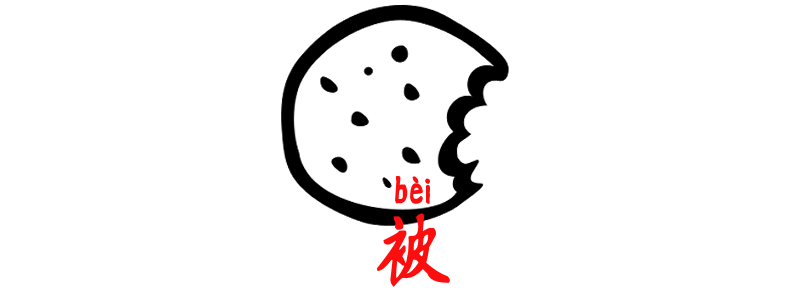Grammar Point:
The passive sentence in Chinese is called 被字句 bèizìjù. It is used to construct passive structures and can introduce either the doer of the action or the action itself. In spoken Chinese, the verbs 叫 jiào and 让 ràng can be used as substitutes for 被 bèi. All of these sentences are considered passive sentences.
What is Passive Sentence
The passive sentence is formed when the subject of a sentence is the receiver of the action described by the verb. It is the opposite of an active sentence, where the subject performs the action. For example:
| Active Sentence | Passive Sentence |
|---|---|
| 弟弟喝了咖啡弟弟喝了咖啡 My brother drank coffee. | 咖啡被弟弟喝了咖啡被弟弟喝了 Coffee was drunk by my brother. |
| 狗咬了我狗咬了我 The dog bit me. | 我被狗咬了我被狗咬了 I was bitten by a dog. |
| 小偷偷走了包包小偷偷走了包包 The thief stole the bag. | 包包被小偷偷走了包包被小偷偷走了 The bag was stolen by a thief. |
When to Use Passive Sentences
- When you want to indicate that someone has been negatively affected or the result is unexpected.
包包被小偷偷走了包包被小偷偷走了
The bag was stolen by a thief.
沒想到我被老師誇獎了没想到我被老师夸奖了
I didn’t expect to be complimented by my teacher.
- When you want to avoid mentioning the “doer” of the action. (HSK 4)
包包被偷走了包包被偷走了
The bag was stolen.
Difference Between 被, 叫, 讓/让
- Only 被 bèi indicates a negative effect, while 叫 jiào and 让 ràng simply indicate passive voice (although it is still possible for the passive action to have a negative connotation).
- In a sentence using 被 bèi, if the doer is not necessary to identify, the object following 被 bèi can be omitted. However, the object after 叫 jiào or 让 ràng cannot be omitted.
- 被 bèi is considered a more formal form, while 叫 jiào and 让 ràng are more casual.
- In Taiwan, it is uncommon to use 叫 jiào and 让 ràng in a passive sentence.
Structure
S + 被, 叫, 讓/让+ O + V + Something
This “something” is crucial and can take different forms. It can serve as a complement, an additional object, or simply be the particle 了 le.
他被女朋友甩了他被女朋友甩了
He was dumped by his girlfriend.
我的詞典叫弟弟弄髒了我的词典叫弟弟弄脏了
My dictionary got dirty by my brother.
我叫大公司錄取了!我叫大公司录取了!
I was hired by a big company!
我的人生讓你毀了!我的人生让你毁了!
My life is ruined by you!
妹妹讓老師罵了妹妹让老师骂了
My sister was scolded by the teacher.
你的頭髮是被狗啃了嗎?你的头发是被狗啃了吗?
Did a dog chew on your hair?
(It implies that your hairstyle looks messy or unkempt as if a dog had chewed on it.)
Negation and Adverbs
You should always place negation words and adverbs in front of 被 bèi, 叫 jiào, 让 ràng in Chinese sentences.
那個手機沒被我弄壞那个手机没被我弄坏
I didn’t break the phone. (unexpected)
他完全讓那小姐迷住了他完全让那姑娘迷住了
He was completely enchanted by the girl.
我的錢包又被人偷了我的钱包又被人偷了
My wallet was stolen again.
Questions
You cannot form a question using 被不被 bèibúbèi. However, you can use question particles like 吗 ma, question words, or 是不是 shìbúshì to form questions.
妹妹被老師罵了嗎?妹妹被老师骂了吗? ✅
Was my sister scolded by the teacher?
妹妹是不是被老師罵了?妹妹是不是被老师骂了? ✅
Was my sister scolded by the teacher?
妹妹被誰罵了?妹妹被谁骂了? ✅
My sister was scolded by whom?
妹妹被不被老師罵了?妹妹被不被老师骂了? ❌
Was my sister scolded by the teacher?
Common Mistakes
我的蛋糕吃完了被妹妹我的蛋糕吃完了被妹妹 ❌
My cake was eaten by my sister.
(Although 被 bèi has been translated as “by,” it is always positioned before the verb in Chinese.)
這本書被我姐姐寫了这本书被我姐姐写了 ❌
This book was written by my sister.
(This result wasn’t negatively affected or unexpected.)
咖啡被爸爸喝咖啡被爸爸喝 ❌
Coffee was drunk by dad.
(You need something after the verb.)
Practice – change it to a 被 bèi sentence
TouchHover over the space to see the answers.
✔️ 小狗吃完了我的飯小狗吃完了我的饭
The puppy finished my food.
我的飯被小狗吃完了我的饭被小狗吃完了
My food was eaten by the puppy.
✔️ 不知道誰拿走了我的手機不知道谁拿走了我的手机
I don’t know who took my phone.
我的手機不知道被誰拿走了我的手机不知道被谁拿走了
My phone was taken by someone.
✔️ 你丟了那些垃圾嗎?你丢了那些垃圾吗?
Did you throw away the garbage?
那些垃圾被你丟了嗎?那些垃圾被你丢了吗?
Did those trash get thrown away by you?
- The Passive Sentence 2 (HSK 4)
- The Passive Sentence 3 给 gěi (HSK 6)
- The Passive Sentence 4 (Advanced) (HSK 7-9)


